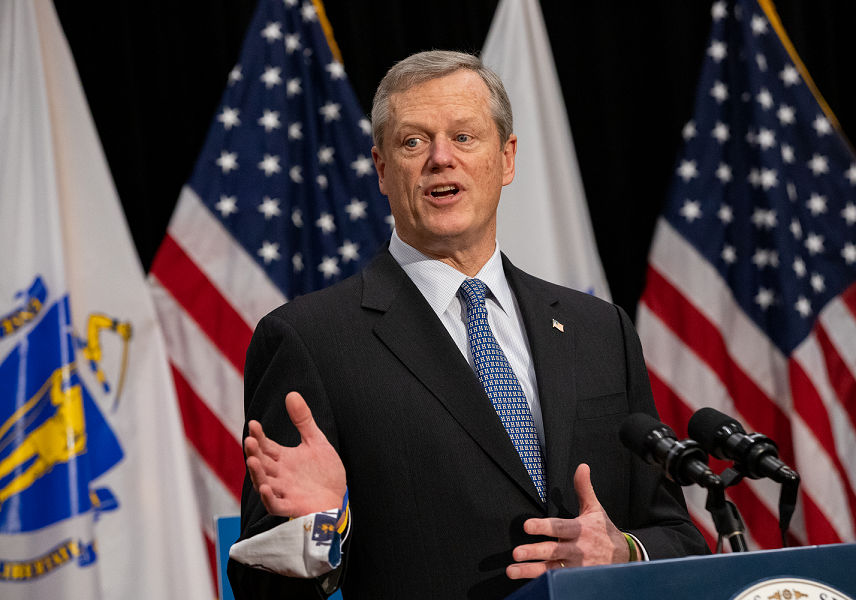latest
Baker: Running from GOP won’t help solve problems in party

By Chris Lisinski
State House News Service
Gov. Charlie Baker on Thursday described his “practical and pragmatic” view of governing as a Republican, defended the results of the Holyoke Soldiers’ Home investigation he commissioned, and yearned for the “stale cookies” and “bad coffee” that used to mark his in-person meetings with legislative leaders.
During an appearance on GBH’s “Boston Public Radio,” Baker took questions from co-hosts Jim Braude and Margery Eagan on topics ranging from his proposed two-month sales tax holiday to expectations for summer school.
Baker expressed concerns over factions of the state and national GOP with whom he has often been at odds, but he said he wants to remain a Republican because he believes a two-party system produces better governing results.
Braude described MassGOP Chairman Jim Lyons’s refusal to remove a state committee member after she made anti-gay remarks that Baker called “disgusting and unacceptable” and votes by many Republican U.S. senators against creating a commission to study the Jan. 6 Capitol riot, then asked why a new voter would choose to be a Republican instead of a Democrat.
“The part of the Republican Party that causes you so much heartburn in many cases causes me heartburn,” Baker replied. “I do believe, and I’ve said this a million times, that I think it’s better to have two parties than one. I think that’s really important for the commonwealth, and I think it’s important, frankly, for the country. I’ve said many times that the complete and utter breakdown in collaborative behavior in Washington is hugely bad for the country.”
Baker said he was hopeful that bipartisan negotiators could find agreement on a federal infrastructure bill, one of Democrat President Joe Biden’s priorities, as news reports spread that they were nearing consensus.
Asked if he supported Republican senators voting against starting debate on a major voting rights bill Democrats pursued, Baker answered, “Of course not.” He referenced the Republican-controlled Senate’s decision in 2016 not to hold a hearing or vote on Supreme Court nominee Merrick Garland as “disgraceful.”
“I don’t think the way to solve the problems that you point to in the Republican Party is to run away from it. I think the way to solve them is to stay and make the case and fight for what I believe, which is a very New England Republican (thing), I agree. I plead guilty to that,” Baker said. “But I would also argue that practical and pragmatic approach, that appreciation for the fact that this is not a business in which you’re supposed to get your way all the time, is a good thing.”
While Baker has criticized fellow Republicans when asked for his opinion, he does not often lob criticism their way unprompted. He also tends to avoid major sparring with the Democrats who wield supermajorities in the House and Senate, opting to voice displeasure on occasion through carefully worded statements.
GBH hosts also pressed Baker about the deadly COVID-19 outbreak that hit the Holyoke Soldiers’ Home in March 2020, leading to the deaths of at least 76 veteran residents and several investigations, including one Baker solicited from former U.S. Attorney Mark Pearlstein.
Baker’s former Veterans’ Services Secretary Francisco Urena resigned in June 2020 one day before the public release of Pearlstein’s report. Urena later said in written testimony that he had concerns about Bennett Walsh, the home’s superintendent at the time of the crisis, but felt “powerless” to address them.
Asked several times what specifically Urena did wrong to warrant his resignation, Baker mostly recounted the results of investigations finding that Walsh and the home were not properly watched or managed. Baker then said of Urena, “He was the guy who oversaw these folks.”
Baker said that, at the time Walsh was tapped to lead the home despite his lack of experience in long-term care, four of the Holyoke home’s seven board members including the chair had been appointed by his predecessor, Gov. Deval Patrick.
“No one called anybody associated with the decision they made to hire Bennett Walsh,” Baker said. “His appointment was viewed at the time by folks in western Mass. as a win.”
A Boston Globe Spotlight report in May questioned some of the findings of the Pearlstein report — whose author told lawmakers his team had a narrow scope but no other constraints on their investigation — and whether it was crafted in a way to shield Baker and Health and Human Services Secretary Marylou Sudders from criticism.
Baker pushed back on Braude’s argument that Pearlstein “was more loyal to the governor’s office, the administration, than he was to the taxpayers of Massachusetts,” calling it unfair.
“He wasn’t asked to do a study on everything associated with the Holyoke Soldiers’ Home dating back three, four years or whatever,” Baker said. “He was asked to do one thing: what happened, and when, and put together a tick-tock associated with all the events between March 10 and when people finally found out about this at our level, which was when Alex Morse, the mayor of Holyoke, called us on a Sunday night.”
“Mayor Morse, the main reason he reached out on Sunday night to the lieutenant governor, was because he was not satisfied that his conversation with Secretary Urena demonstrated that people understood the urgency with which he believed we needed to act,” Baker added.
Pearlstein’s timeline, Baker said, is “consistent” with what subsequent investigations including one done by the Legislature have found.
Baker’s Thursday interview was the first of his semi-regular “Ask the Governor” appearances to be recorded in-person in more than a year, a fact that he and the hosts noted with excitement.
As the discussion wrapped up, Baker pointed to the state’s success at getting 4.1 million residents fully vaccinated and described the COVID-19 vaccine as a powerful tool supporting “our ability to see each other as people.”
“Honestly, I know this sounds kind of corny, but the fact that I haven’t actually seen (Senate President) Karen Spilka or (House Speaker) Ron Mariano in person, except maybe at one event for a couple of minutes, and that we don’t actually sit down and eat stale cookies and drink bad coffee once a week — I think it’s a problem,” Baker said, speaking over the segment’s outro music. “Human beings see each other as people when they spend time with each other in person.”
He continued, expressing hope that the COVID era will prompt more people to treat each other with respect.
“It’s so easy for everybody to get nuts about someone you never see, ever, and that’s kind of where we’ve been for the past year,” Baker said. “I don’t think it’s a good thing.”






Mortis Maximus
June 27, 2021 at 9:05 am
This guy is a sock puppet!